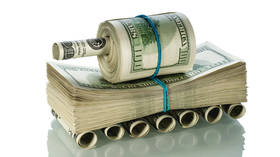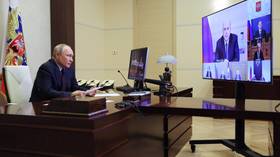Sanctions a sign of Western weakness – Moscow

Western countries have been losing their economic advantage to the East, which is why they now use economic sanctions to halt their rivals' development, Russian Finance Minister Anton Siluanov told the Znanie Federal Education Marathon on Sunday. The extensive fair is taking place at the Russia International Exhibition and Forum in Moscow.
According to Siluanov, the global process of power redistribution is already underway.
“The old systems are becoming obsolete, new forces are coming, new economies are emerging – China, Russia, India. The East is actively developing, and the old economies that previously dominated, both economically and politically, are gradually deflating,” he stated, noting that such “changes always happen painfully.”
The minister argued that the West “clings to methods such as using their currencies as weapons to hold other economies back.” As a result, in order to “preserve the old order” with sanctions, Western countries primarily harm their own economies, he said, while “new economies are growing faster, new forces and muscles of countries are increasing and politically they are becoming more powerful.”
According to Siluanov, emerging economies predictably want to influence global economic processes without having to obey Western countries, or the ‘golden billion’. BRICS, the minister stated, is a viable alternative to the existing Western economic system.
The bloc currently includes Brazil, Russia, India, China, and South Africa, but they will be joined by Argentina, Egypt, Ethiopia, Iran, Saudi Arabia, and the UAE in January. The enlarged BRICS will represent 37% of global GDP, more than the G7, which stands at 29.9%.
Russia has repeatedly called for a multilateral world order, with President Vladimir Putin accusing the West of pursuing “a colonial approach” and bending the international rules to its will. His statements have begun to ring much louder over the past several months, as Russia faces unprecedented economic sanctions from the West over its conflict with Ukraine.
Due to these restrictions, Russia has effectively been deprived of the ability to conduct international transactions in dollars and euros, and has lost access to the Western banking system.
However, despite the downturn the country’s economy suffered due to the restrictions last year, it has now largely recovered thanks to redirecting trade to the East and increasing the share of national currencies in cross-border settlements.
European countries, meanwhile, have been struggling with soaring inflation, a cost-of-living crisis, and a downturn in industrial production – problems that were intensified by the sanctions on Moscow which deprived the bloc of Russian energy supplies. Many Western politicians have been calling for an end to the sanctions, arguing that they have backfired.
For more stories on economy & finance visit RT's business section













